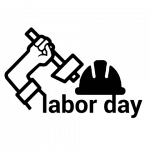We all know that when life hands you a lemon that you should make lemonade. But what should you do when the lemons come in multiples and so quickly that there isn’t time to look for the juicer? August was that sort of month for Jeanne and me, as we dealt in quick succession with the death of her brother and the loss of our dachshund Winnie on the same day, then the hospitalization of our daughter-in-law followed by the hospitalization of Jeanne’s niece. What happens when all of our best plans and preparations get thrown out the window at a moment’s notice by factors beyond our control?

During a transformational sabbatical semester over a decade ago, I spent many hours, often three times daily, in the choir stalls with the Benedictine monks of St. John’s Abbey in Collegeville, MN for prayers and reading psalms. The rhythm of prayer cycle and psalms specified by Benedict’s Rule is intended to match the cyclical nature of daily, weekly, and monthly human life; one of the most valuable gifts I received during that sabbatical was recognizing these own cycles in my own life. They had always been there, but those four months with the monks helped me become consciously aware of them and of their value for the first time.
For instance, each daily Morning Prayer liturgy (at 7:00 at St. John’s) begins with a hopeful opening prayer:
O Lord, open my lips, and my mouth shall proclaim your praise!
But five hours later, in the very same choir seat, I would say the following opening lines along with the monks at the start of Noon Prayer:
O God, come to my assistance; O Lord, make haste to help me!
Built into these two opening sentences is a psychological insight that doesn’t need religious language to be recognized as true. We often start our day with the best of intentions and optimistic hopes for what we will do and be in the hours ahead. But within a few hours, everything has gone “tits up,” and we need help.
We all know various sayings and platitudes intended to remind us of the unpredictable nature of even those things we believe are most within our control. “Life is what happens when you are making other plans.” “If you want to give God a good laugh, tell Her your plans.” In my three decades of teaching philosophy on the college/university level, I’ve discovered a few common threads running through even the most disparate of philosophical perspectives and frameworks—these are the threads that I regularly seek to bring to my students’ attention every semester.
For instance, I ask my students to close their eyes and imagine themselves ten years from now. Are you in graduate school? Climbing the corporate ladder at your dream job? Are you in a long-term relationship with a significant other? Do you have children? Where do you live? What kind of car are you driving? Be as specific as possible.
I see smiles creep over my students’ faces as they imagine themselves a decade in the future. Because, of course, very few people (if any) would imagine tragedy, loss, failure or struggle during such an exercise. After a couple of minutes, I break them out of their reveries with this:
You know that “you” ten years from now that you’ve been imagining? None of that is going to happen. None of it, at least not in the way that you are imagining right now. The only thing that we all know for certain is that, barring a major breakthrough in medical knowledge and technology, one hundred years from now everyone in this room will be dead. And the path from here to there will be full of unknowns, things that you cannot possibly predict or plan for fully.
Whether that is the worst news you ever heard or strangely good news depends on you. What resources have you developed, what attitudes are you cultivating regularly, that will help you when “shit happens”? In a conversation with my former sister-in-law last summer, a person with whom I had not had an extended conversation for three decades, we compared notes relevant to exactly these questions and issues. Each of us have been run over by several unforeseen steamrollers in the past many years, and both of us—against all odds, it would seem—are still standing and, arguably the better for those unexpected people, places, and things that we had to face without preparation.
Although our stories are very different, we agreed on at least one thing. “I can’t imagine dealing with any of this, let alone facing the next day, if I didn’t believe that there is something bigger than me going on,” she said. We both used the word “God” frequently in our conversation, but by that word neither of us means anything like the various traditional religious models of the divine that most of us are familiar with. It’s a sense of mystery, of being an important—but very small—piece of the larger cosmic puzzle.
Jeanne and I occasionally work on 1000 piece puzzles; I’m often gratified to get no more than ten pieces located correctly in a day. But each piece has its proper place, and the whole is incomplete unless that proper place is found. Someone else knows the big picture—I need to be satisfied with believing that I’m a tiny but essential piece of the big picture I’ll never see. And finding my place is part of my life’s journey.
My son Justin is a mental health professional who, in brief, saves lives in various ways on a daily basis. He once told us of the day when he and his health professional colleague went out on a call to an address where a young man was suicidal. While there, in quick succession, Justin’s colleague—who had not eaten breakfast that morning—got light-headed and passed out. Shortly after, Justin was attacked by a swarm of yellowjackets that he only escaped, after being stung a couple of dozen times, by jumping into a pool behind the house. By the time the excitement was over, the young man whom they came to help was apologizing profusely to Justin and his colleague. and asking if they needed help.
No apologies necessary, though. It’s just the way things happen sometimes. “F—k that call!” Justin said as he and his colleague were driving back to the office. “I think I’m taking the rest of the day off,” she said in response. But they were both back in the saddle the next day. Because as various people have told us over the years, ninety percent of success is showing up. The other ten percent is developing the flexibility to deal with whatever the day has to offer.













